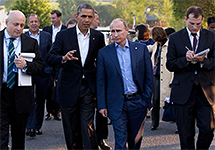Miles A. Pomper
February 8, 2016
 The following is an excerpt of an article published in the World Politics Review.
The following is an excerpt of an article published in the World Politics Review.
U.S. President Barack Obama’s commitment to preventing and rolling back the spread of nuclear weapons was clear from the first days of his administration, when he pledged in Prague in April 2009 “to seek the peace and security of a world without nuclear weapons.” The historic vow shattered precedent, seized international attention and helped him win the Nobel Peace Prize later that year. Yet as he prepares to leave office seven years later, it appears that with the exception of a fledgling nuclear deal with Iran, Obama will leave an arms control legacy that is arguably little better than that of his Republican predecessor, George W. Bush.
Indeed, in many ways, Obama’s presidency has served as an object lesson in the limits of a U.S. president’s ability to shape a global nuclear order amid competing tugs from foreign competitors and allies, domestic politics and bureaucratic factions. In the past several years, forces abroad—Russian President Vladimir Putin, North Korea—and at home—congressional Republicans, elements in the Defense and Energy Departments—have all challenged Obama’s vision to the point where his successor is now likely to be pressured to give nuclear weapons a renewed role in U.S. national security policy. …
Read the full article in WPR (subscription required).
